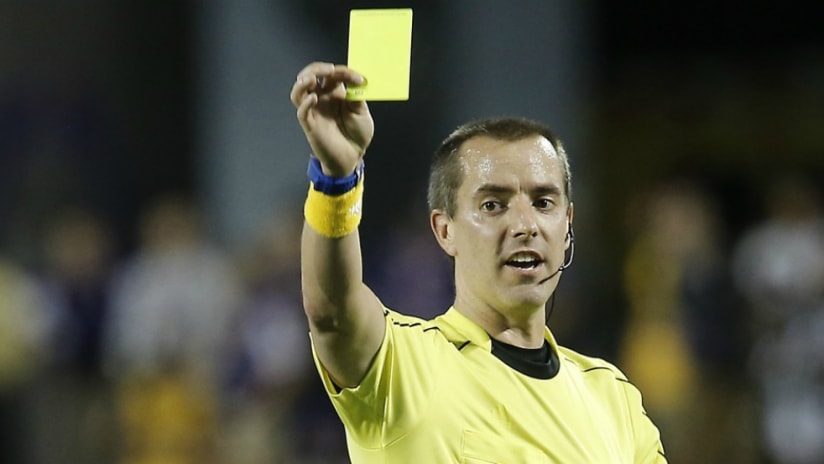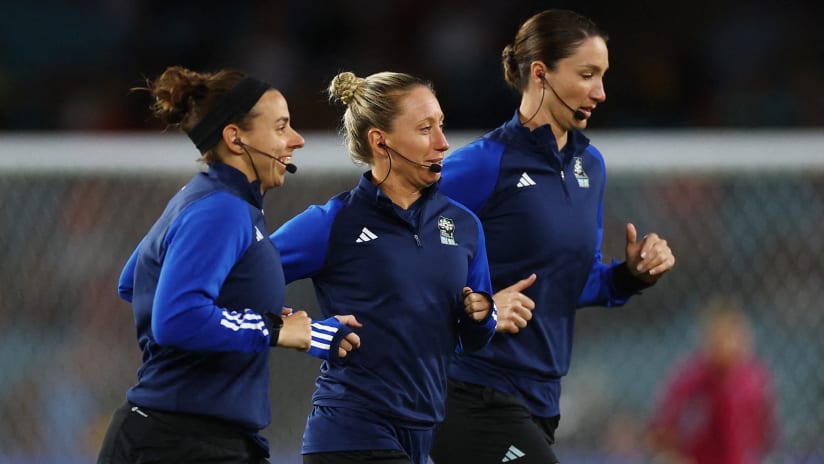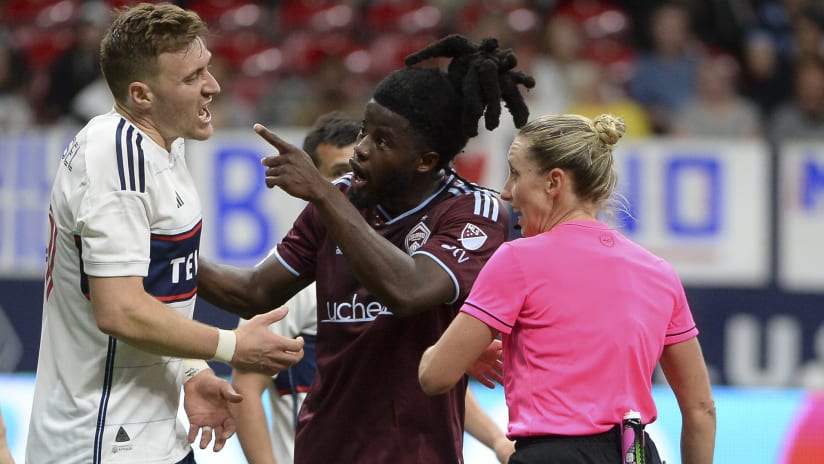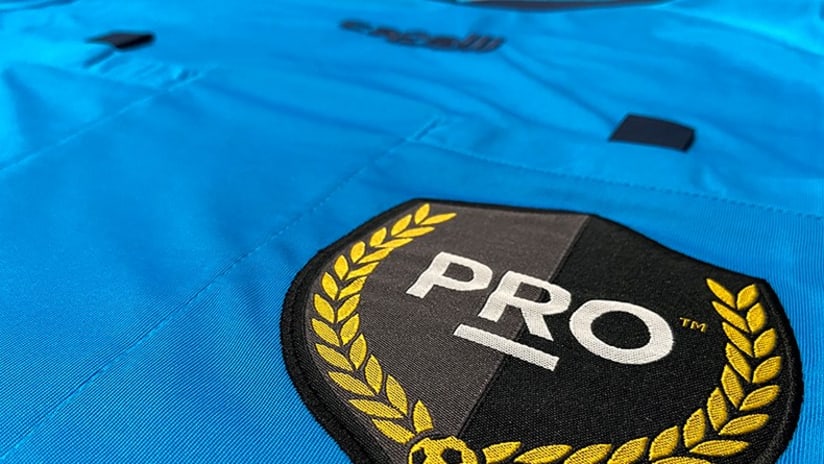Long before Mark Geiger was selected to referee two World Cups, he stumbled into the business as a 13-year-old boy looking for some pocket change.
In December of 1987, Geiger took a refereeing course in New Jersey and became certified. From there, he embarked on a career in which he oversaw hundreds of MLS games as well as international tournaments, becoming one of the best at his craft as a two-time MLS Referee of the Year.
And it had to start somewhere.
“I was just looking to make a little extra money," Geiger told MLSsoccer.com with a laugh. He retired from officiating ahead of the 2019 season and is now director of senior match officials for the Professional Referee Organization.
It's a long journey from grassroots to MLS, but it's a path traveled. Here's what a prospective referee would need to do to rise from wandering into a state refereeing course all the way to a World Cup game, just like Geiger.
Getting started
To get registered, an interested person needs to go through their state organization within U.S. Soccer. The process comes with a background check and then involves an in-person course that spans a weekend, including a field session for basic mechanics.
It's similar in Canada. Prospective referees sign up through their respective provinces and then begin the certification course, which consists of 16 hours that can be broken up over a weekend or multiple weekends. It includes both classroom and field work.
“I call it a basic survival course for your first year of refereeing," said Isaac Raymond, manager of the referee department in Canada Soccer.
From there, referees are given local recreation or travel games on both sides of the border. In the US, they start as a Grade 9 referee and hope to start moving up the ladder starting to becoming a Grade 6, the highest in each state. Reaching Grade 5 signals readiness for national matches. (Here's a full breakdown of the US grade system.)
“It’s a pretty long journey," Geiger said. “But it’s similar to what the players will do. They start in rec or travel ball, start developing their skills and comfort level."
“When I became a referee, there was no practical training," Raymond added. "It was just a classroom course then they literally just booted you out there. You ended up on a field with a whistle or a flag and you have no idea what you’re doing. Well, some may say it never went up from there. But, yeah, that’s just the way it was back then. It was pretty scary.”
As those skills are developed, the states will identify and push individuals forward to bigger games and tournaments, including the state cup. The best will continue with regional championships, as well as Development Academy and high-level amateur games. That's where they'll be spotted and potentially given chances to get on the professional radar at identification events, where PRO and PRO2 are scouting.
PRO is the organization that oversees referees in MLS, while PRO2 handles assignments for USL Championship, NWSL and USL League One, which feeds referees to MLS. Three referees graduated from PRO2 to PRO for the 2020 season.
“The big platform for us is the Generation Adidas tournament," said Alex Prus, Director of PRO2 Match Officials at Professional Referee Organization. "MLS supports officials, bringing them from all over the country to this tournament. It costs money but they understand that good officiating raises the level but also provides PRO with a great platform to see new prospects before we start assigning them to matches. With so many international teams coming to GA Cup, the games are quite challenging."
Prus' entire staff attends the GA Cup, watching the referees at every game. There, they also meet with the refs for training and learning, as they're together throughout the tournament, and break down film.
It's a similar path on the Canadian side. Referees that excel at the district level graduate to the regional level. The provinces then identify the best of the bunch there, give them added testing in the laws of the game, fitness and more before they become provincial referees, where Raymond and his group begin seriously scouting candidates to reach the national level, the highest in the country, which allows them to oversee professional games.
Just as inexperienced players are given platforms to showcase their abilities, so, too, are referees looking to make their way in the game.
Key skills
Referee prospects stand out mostly by their ability to manage the game, more so than their specific decisions. People get things wrong every so often, it's human nature. Ensuring that a game doesn't escalate and communicating with players and coaches is a valuable trait.
“Number one is game management," Prus said. "The fouls are almost the same, all cautions and send offs, we can show videos and referees they get it. But the jump from youth to professional, player management is key. When to talk silently with a player, when to do a public warning, you know? That’s what we focus on. Sometimes maybe the technically right decision can be bent for the practically right decision.”
“You need a lot of self-belief as well," added PRO GM Howard Webb. "When you’re officiating, people will make you question your decision making. They’ll appeal for things when they know they have no right to that particular decision, but they’ll still try to make you make a mistake. That’s the nature of sport. And you need to have a calm head with good communication sport. There’s not always a clear answer, it’s how you communicate your decision.”
PRO2 has divided their referees into three tiers: Tier A, consisting of six referees who are closest to getting a trial game in MLS, Tier B, featuring eight who are next level down then Tier C, which includes 16 referees. They also have a developmental tier consisting of 17 refs they also assign games to.
“I’m in constant communication with Alex on the performance for referees in his group," Geiger said. "I watch USL matches for referees we’re interested in, if they consistently do well at USL, they can get a trial game in MLS.”
In Canada, referees have a similar path to MLS games.
“First, we’re looking for commitment," Raymond said. "We need referees who have a lifestyle that allows them to be committed to a pretty intensive program. That’s a big thing. Of course, we want athletes. Referees are no different than top athletes. They also need to be really good with people and, needless to say, understanding the laws of the game. We’re looking for a package.”
When candidates are ready and display that package, Raymond will push them to PRO to see if they can get a trial game.
A trial game in MLS is all Geiger hoped for when he was working up the ranks and ended with much more. Until 2011, referees were still part-time so Geiger was teaching high school math in New Jersey, ranging from algebra 1 to advanced placement calculus. He was even one of 103 recipients of the Presidential Award for Excellence in Math and Science Teaching in 2010, before becoming a full time ref and working the 2014 and 2018 World Cups.
“The World Cup is just another step up, it’s a much bigger stage, but it’s still the game of soccer," Geiger said. "Sure, the speed may change but a tackle is a tackle, a yellow is a yellow and a red is a red. It’s the same game, just a little more different.”
Prus' journey was a bit different.
Born in Poland and even a second division professional soccer player, he came to America with a masters degree in coaching but didn't speak English, a hurdle in his desire to coach. (He jokes “Just ask Howard—he’ll still tell you I don’t speak English now.”) Hoping to stay in soccer after he learned a bit of the language, he decided to pursue becoming a referee.
“I didn’t like officials very much when I played," Prus joked. "I guess I came full circle."













